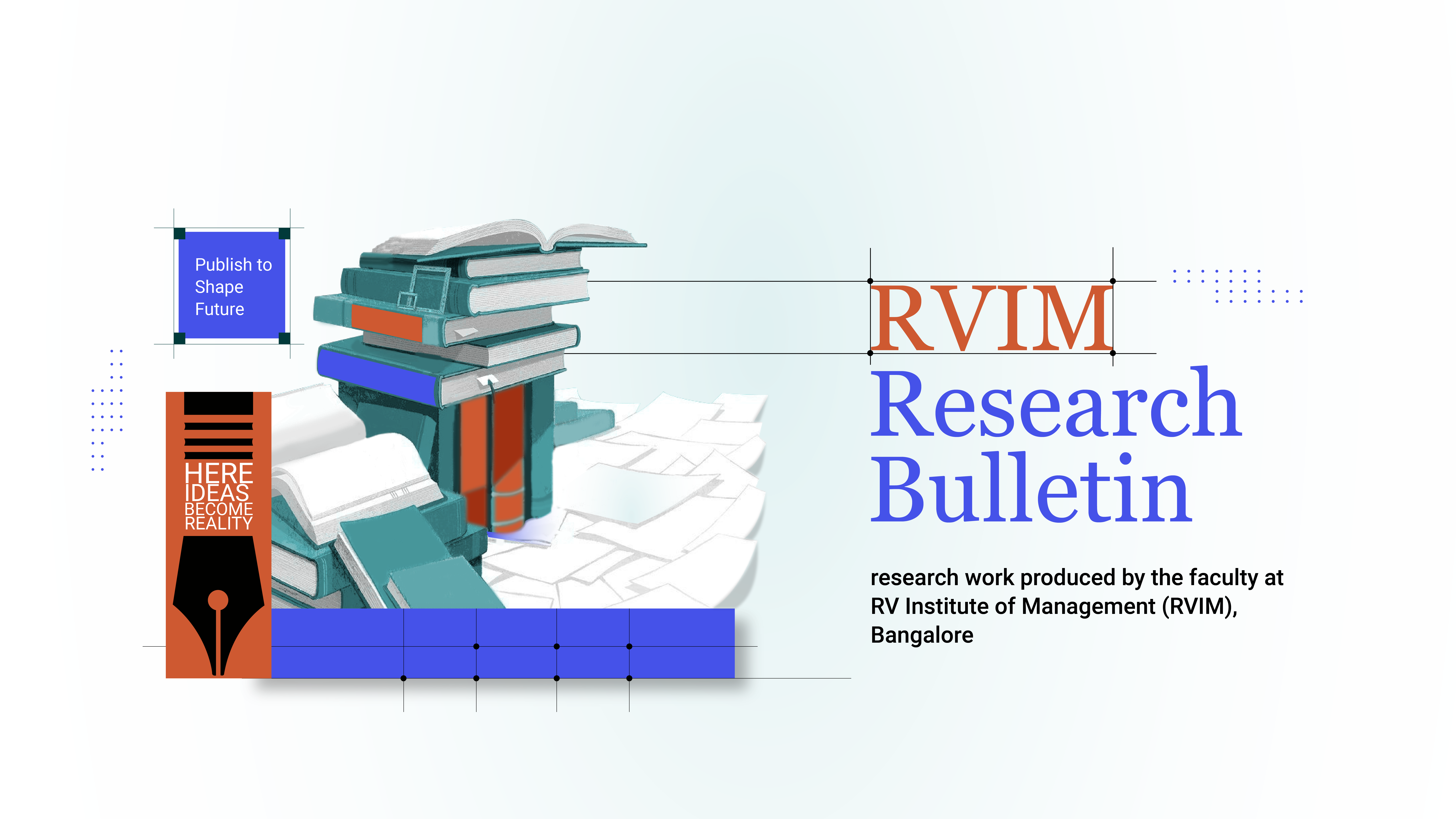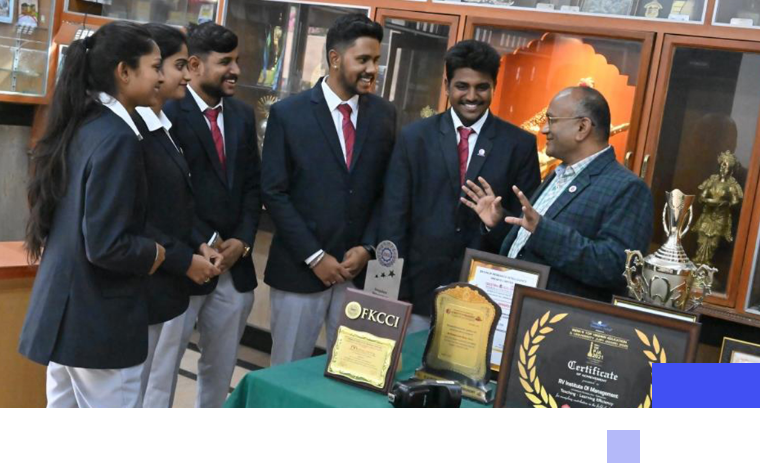

The Findings of an Empirical Investigation on Cloud-based Computation Usage as a Strategy Innovation | By Dr. Noor Firdoos Jahan
The current research experimentally examines the elements that influence the usage of cloud-based computation in organizations where the strategy is regarded as strategic for performing their operation. To examine the elements that impact the intent to use cloud computing, a study framework was created that incorporates the elements discovered in the technological acceptance model (TAM) with other exterior elements like high-level management assistance, firm size, training, interaction, and technical complication.

The Journey of empowerment through social entrepreneurship | By Dr. Tamizharasi
The Sejal New life foundation (SNLF) is an India-based charity that was established in 2011.Their mission is to promote good mental health in every section of society and to prevent mental health issues through training and awareness programs. SNLF has conducted 250 campaigns and programs in villages, schools, colleges, and organizations pan India and across the globe through online and offline modes to promote their cause.

Yashram Lifestyle Brands Pvt Ltd: strategizing for omnichannel approach | By Dr. Tamizharasi
After completion of the case study, the students will be able to illustrate issues in offline marketing and strategy for an in-store business, familiarize students with the challenges involved in the decision-making in integrating online and offline marketing strategies, evaluate the advantages and disadvantages of online and offline marketing and motivate students to apply marketing strategies to real-world business situations.

A Theoretical And Empirical Investigation On Internet Of Things And Digital Marketing; Opportunities, Issues And Challenges | By Dr. Purushottam Bung
The integration of IoT with digital marketing presents a myriad of opportunities for businesses to enhance customer engagement, personalize marketing campaigns, and drive innovation. However, along with these opportunities come several inherent issues and challenges that businesses must address to maximize the benefits of IoT- enabled marketing strategies.

Social Entrepreneurship Development: Assessing the Role of Social Entrepreneurial Self-Efficacy and Effect of Government Regulations as Moderator | By Dr. Purushottam Bung
The principal aims of the research were to evaluate the impact of government regulations and Self Efficacy as a moderator on the development of social entrepreneurship. 459 respondents from Delhi-NCR filled out the questionnaire correctly that collected the data for further analysis. The technique employed in this study to gather information from a sample of 459 respondents was purposeful sampling.

Creating an Advanced Recommendation System Integrating Collaborative Filtering and Social Media Analytics for Enhanced Customer Engagement | By Dr. M Jahnavi and N Nagasubba Reddy
The rapid expansion of online platforms necessitates sophisticated recommendation systems to enhance user engagement. Leveraging user preferences and social interactions, the system aims to provide dynamic and tailored recommendations. Traditional recommendation systems face challenges in accuracy and personalization. Collaborative filtering struggles with the cold start problem, and social-based approaches may overlook individual preferences.

Constructing a Blockchain-Based Loyalty Program Model for Secure and Transparent Customer Rewards in Retail Marketing | By Dr. M Jahnavi
As the retail industry continues to evolve in the digital era, businesses are exploring innovative solutions to enhance customer engagement and loyalty. This research proposes a novel approach to loyalty programs by leveraging blockchain technology to create a secure and transparent model for customer rewards. Traditional loyalty programs often face challenges related to security, transparency, and trust, leading to issues such as fraud and customer skepticism.

Does the Weather Influence Asia’s Top Stock Market Returns | By Dr. Noor Firdoos Jahan
This study investigates the relationship between weather patterns and stock market returns across major Asian economies from 2000 to 2023. Drawing on monthly index data from nine prominent Asian stock exchanges, the research categorizes weather into hot, wet, and dry seasons to analyze their impact on market performance.

A Deep Neural Network Approach to Predict Stock Prices Using Unconventional Data: Some Evidences from India | By Dr. Tamizharasi
Prediction of the stock price is one of the major concerns in today’s need. Due to the pandemic, financial stability of the country was cryptic. It made investors in a predicament whether to invest or where to invest. Predicting the stock market helps to determine futuristic stock value of financial exchange. In this paper, authors have used Convolution Neural Network (CNN) and XGBoost, a class of Deep Neural Networks in predicting the stock prices. CNN and XGBoost identify predominant features among various other features without human intervention.

Assessing Machine Learning Algorithms Performance in Predicting Stock Market Trends Using Varied Input Combinations | By Dr. M Jahnavi, Dr. Purushottam Bung and N Nagasubba Reddy
This study presents a thorough investigation of the variables affecting price changes in the Indian Stock Market. The study aims to pinpoint the key elements that significantly influence the closing price of the Indian stock market (Nifty 50) by utilizing three different datasets and two different machine learning algorithms. The results show a notable result: the efficiency of the algorithm did not significantly increase as a result of including economic variables in the analysis.

Sustainability or Technology -What Drives Consumer Purchase Behaviour in Digital Era? | By Dr. Noor Firdoos Jahan
Retail industry is undergoing transformation. Many changes are happening in this industry due to change in consumer behaviour. Every retailer is trying to understand, what drives the customers to select the retailer? It is technology, sustainability or both. Retailers are trying to identify the right technology for their business, which will delight customers and at the same trying to find out how to achieve sustainability in their business.

Optimizing Mutual Fund Portfolio Management through the Application of Advanced Soft Computing Techniques | By Dr. M Jahnavi and N Nagasubba Reddy
The effective management of mutual fund portfolios is paramount for investors seeking to optimize returns while minimizing risk. However, traditional optimization techniques often struggle to accurately forecast portfolio performance, leading to suboptimal investment decisions. To address this challenge, this paper offers a novel solution to this problem by combining the Quantum Neural Network (QNN) for performance prediction with the Quantum-Inspired Evolutionary Algorithm (QEA) for portfolio optimisation.

Evlogia Eco Care: start-up to scale-up | By Dr. Tamizharasi and Dr. Purushottam Bung
After completion of the case study, students will be able to discuss the characteristics of sustainable enterprises driving the innovation; analyze the concept of waste to wealth, along with its associated benefits and challenges; provide an example of a sustainable start-up that operates conventionally and is attempting to increase production capacity through automation; and describe the strategies for scaling up the business.

Exploring the Impact of Security, Confidentiality, and Related Factors on M- Banking Adoption in India: A Machine Learning Perspective | By Dr. M Jahnavi, Dr. Purushottam Bung and N Nagasubba Reddy
The digital payment sector is becoming an increasingly important aspect of people’s life as a result of recent advancements in mobile and internet technology, delivering numerous fascinating and helpful services like M-banking. The m-banking system enables consumers to make purchases from anywhere using any electronic device, including mobile phones or tablets. M-banking is expected to have a better future as a result of current movements in international digital markets.

Evaluating the Impact of E-Service Quality Attributes on Customer Satisfaction and Purchase Intentions for Electronic Gadgets and Home Appliances, India | By N Nagasubba Reddy, Dr. M Jahnavi and Dr. Purushottam Bung
The objective of the study is to analyse the impact of e-service quality attributes on customer satisfaction and on purchase intention and purchase frequency of electronic gadgets and home appliances in Bangalore, India using the service quality (SERVQUAL) model. The e-service quality attributes chosen for the study are empathy, information, security, reliability, user interface, responsiveness, fulfillment, and personalization. This paper extends existing research by quantifying the impact of chosen attributes of e-service quality on customer satisfaction and purchase intentions, and on purchase frequency.

SUSTAINABILITY IN CANDLE PRODUCTION: A CASE STUDY ON GANDHADAGUDI CANDLES ECO-FRIENDLY PRACTICES AND MARKET IMPACT | By Prof. Anitha BM Dsilva and Dr. Purushottam Bung
This case study explores Gandhadagudi Candles, a brand committed to sustainability by producing eco-friendly candles using natural, renewable, and biodegradable materials such as soy wax and beeswax. The case focuses on the brand's sustainable practices, including the use of natural scents, recyclable packaging, and energy- efficient production methods. Through the use of a circular economy model, Gandhadagudi Candles has reduced its carbon footprint, improved cost savings, and enhanced customer loyalty.

AI IMPLEMENTATION IN DIGITAL PAYMENT: AN EMPIRICAL ANALYSIS ON BANKING SECTOR IN INDIA | By Dr. Purushottam Bung
To study AI Implementation in Digital Payment, as an empirical analysis on Banking Sector in India. Questionnaires comprised of closed-ended questions were given out in order to accomplish these objectives. The elements of the proposed model were evaluated using the validity, correlation, and reliability analyses.
About
RV Institute of Management


A unique B-School that carries the flag of the Rashtreeya Vidyalaya (RV) Group of institutions academic excellence, R.V Institute of Management (RVIM) was founded in the year 1999. It is one of 27 leading educational institutions of national and international repute that are managed by the Restreeya Sikshana Samithi Trust (RSST), which is spearheading the cause of education in various fields since 1940. RVIM is an autonomous institution for excellence is approved by the ALL India Council for Technical Education (AICTE) New Delhi, Affiliated to Bengaluru City University, and Recognized by Govt. of Karnataka. It is located in a state-of-the-art campus in Jayanagar, a beautiful and centrally-located suburb of the city of Bengaluru, India. RVIM offers a two-year full-time Autonomous Master of Business Administration (MBA) program (affiliated to BCU), and also offers many value addition programs in the specialized areas of Banking & Insurance, Entreoreneurship, Finance, Healthcare, Human Resources, Marketing, Business Analytics, Operations and Supply Chain Management. The institute focus on research and encourage and support both faculty and students to involved in research and contribute to the research output of the institute.
Professor,
RV institute of Management
Assistant Professor
RV institute of Management


